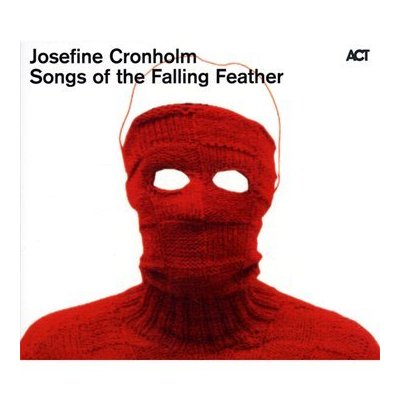
by Ian Mann
June 04, 2010
/ ALBUM
Extremely personal and superbly crafted. A record capable of finding a considerable niche constituency.
Josefine Cronholm
“Songs of the Falling Feather”
(ACT 9495-2)
Singer Josefine Cronholm is probably best known to British listeners for her work with Django Bates’ Quiet Nights band. Born in Sweden but now resident in Copenhagen her albums “Wild Garden” (2002) and “Hotel Paradise” (2003) garnered considerable critical praise in Scandinavia and twice won her the Danish Jazz Grammy award. She has led her own band Ibis and has also collaborated extensively with percussionist Marilyn Mazur.
“Songs of the Falling Feather” is Cronholm’s début for ACT and her switch to this influential label with it’s extensive distribution network should help to bring her music to the attention of the international audience. It’s a highly distinctive record, inspired by a love of nature and the open spaces of her native Scandinavia. A love of impressionist painting is another source of inspiration and there’s a misty, impressionistic quality about Cronholm’s music plus a certain quirkiness that perhaps stems from her involvement in Bates’ groups.
There is little orthodox jazz on “Songs of the Falling Feather”. Cronholm deploys an unusual instrumental line up including a string quartet and the resultant music is more likely to appeal to the followers of Bjork than to hard core jazz fans. Nevertheless there’s much to enjoy about Cronholm’s nature inspired music. She manages to convey a sense of wonder about the world without ever becoming twee or wishy washy.
Her chief musical collaborator on this project is Henrik Lindstrand with whom she worked in the ambient outfit Factum Est. Lindstrand adds his distinctive guitar, keyboard and programming skills as well as acting as arranger and producer. Lindstrand thus has a considerable influence on the sound of the record. Other contributors are former Ibis bassist Thommy Andersson, guitarist Gustaf Ljunggren, drummer Per Ekdahl and Norwegian trumpeter Gunnar Halle. The string quartet comprises of violinists Julie Eskaer and Anna Gwozclz with Iben Teilmann on viola and Emilie Eskjaer on cello.
The string quartet are prominent in a dramatic Lindstrand arrangement on the first number “Paralysed”. The lyrics deal with the feeling of being caught in the headlight’s glare by the complexities of modern life. There’s a strong pop sensibility at work here too mixed in with the darkness- Cronholm’s work bears comparison with that of the UK’s own Gwyneth Herbert, another artist who occupies the hinterland between jazz and contemporary singer/songwriterdom.
“Seagulls” is more stripped back with Cronholm’s pure vocal accompanied by acoustic guitar, subtle electronica and Halle’s haunting trumpet. It’s melancholy and unmistakably Nordic in tone and execution.
“Fountain” has a gorgeous minor key piano led melody with Cronholm’s voice taking on a Joni Mitchell like purity . Judicious electronica adds colour to the arrangement. With no rhythm section as such the song seems to shimmer on the horizon evoking that earlier comparison with impressionist painting.
“Mermaids” blends Cronholm’s pop and impressionistic leanings into three delightful minutes in an arrangement led by pointillist guitar and featuring rich toned arco bass.
The piano led “Winter Princess” has a similarly strong melody and a richly colourful arrangement from Lindsrand. Throughout the album the arrangements are masterful, often deploying a less is more approach but always interesting. Cronholm and Lindstrand are highly adept at using space to give texture and nuance, thus their arrangements manage to be both sparse and highly colourful simultaneously.
“Angel” continues the mood of introspection, an almost anthemic paean to a “Guardian Angel” figure. The following “Quiet” movingly draws parallels between natural elements such as soft rain and drifting clouds and the human emotions of loneliness and doubt. The arrangement is enriched by delicate acoustic guitar and breathy, velvety trumpet.
The epic “Sailor” charts the loneliness of enforced separation, the arrangement encompassing dolorous piano chords, yearning vocals, grainy arco bass, ghostly trumpet and even more ethereal lap steel guitar.
The bitter-sweet “Lonely Is The Heart” evokes frozen winter landscapes and the search for something meaningful. The line “time is a thief” reminded me of the same phrase being used in Peter Hammill’s “Forsaken Gardens”. Cronholm refers to her lyrics as “texts” which suggests that, like Hammill she considers the words of a song to be hugely important. It’s probably just co-incidence but I wonder if she has in fact listened to Hammill, for me one of the finest lyricists Britain has ever produced.
Finally we have the elegiac “Mystery” with its musings on love and life and a typically lush/stark arrangement. Musically it’s this kind of dichotomy that makes “Songs of the Falling Feather” so interesting.
This is an extremely personal record and one that is superbly crafted. There is much to admire here but sometimes the music appears to occupy a kind of stasis. The persistently introspective mood begins to pall after a while and the album as a whole would benefit a greater variation of style and pace. Nonetheless it’s the kind of record that may acquire a certain cult following . Fans of Bjork, Kate Bush and Joni Mitchell are likely to find something to enjoy here and there are also parallels with the work of more jazz influenced singers such as Gwyneth Herbert and Solveig Slettahjell. “Songs of the Falling Feather” is not a record for everybody but it’s still capable of finding a considerable niche constituency.
blog comments powered by Disqus